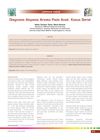 5 citations,
August 2014 in “Journal of The American Academy of Dermatology”
5 citations,
August 2014 in “Journal of The American Academy of Dermatology” Smoking doesn't cause or prevent Frontal Fibrosing Alopecia, hormonal imbalance may be involved, and a combination of antiandrogens and steroids can help stabilize the condition.
[object Object]  4 citations,
October 2016
4 citations,
October 2016 Herbs like aloe vera and amla are effective and safe for treating hair loss.
 3 citations,
January 2010 in “Actas Dermo-Sifiliográficas”
3 citations,
January 2010 in “Actas Dermo-Sifiliográficas” Immunization and throat bacteria may increase the risk of a hair loss condition called alopecia areata.
 2 citations,
December 2022 in “PNAS nexus”
2 citations,
December 2022 in “PNAS nexus” SCD-153 shows promise as an effective topical treatment for alopecia areata.
 2 citations,
December 2020 in “American Journal of Dermatological Research and Reviews”
2 citations,
December 2020 in “American Journal of Dermatological Research and Reviews” The combination therapy was effective and well-tolerated, especially in young patients.
 1 citations,
October 2023 in “Dermatology and therapy”
1 citations,
October 2023 in “Dermatology and therapy” Some treatments for severe hair loss work but often have side effects, with baricitinib showing the most promise.
 1 citations,
October 2023 in “Clinical, cosmetic and investigational dermatology”
1 citations,
October 2023 in “Clinical, cosmetic and investigational dermatology” Traditional treatment for pediatric alopecia areata is most effective and should be first choice.
 1 citations,
February 2023 in “Deleted Journal”
1 citations,
February 2023 in “Deleted Journal” Diphenylcyclopropenone is effective for treating alopecia areata but has a high relapse rate.
 December 2024 in “Journal of Population Therapeutics and Clinical Pharmacology”
December 2024 in “Journal of Population Therapeutics and Clinical Pharmacology” Rosemary and kalonji seeds can improve hair health and treat hair conditions.
 October 2024 in “Journal of Education Health and Sport”
October 2024 in “Journal of Education Health and Sport” Alopecia areata treatment should be personalized, using topical or systemic therapies based on severity, with promising options like JAK inhibitors needing more research.
 July 2024 in “International Journal of Medical Arts”
July 2024 in “International Journal of Medical Arts” Latanoprost is more effective than minoxidil for treating alopecia areata.
 April 2024 in “Journal of asthma and allergy”
April 2024 in “Journal of asthma and allergy” Abrocitinib effectively treated severe atopic dermatitis and mild alopecia areata in a 12-year-old boy after dupilumab failed.
 January 2024 in “Archives of dermatological research”
January 2024 in “Archives of dermatological research” Both treatments for alopecia areata showed similar modest effectiveness.
[object Object]  December 2023 in “International journal of multidisciplinary research and analysis”
December 2023 in “International journal of multidisciplinary research and analysis” SH-MSCs gel reduced IL-6 and increased TGF-β, suggesting it could treat alopecia.
 October 2023 in “Dermatology practical & conceptual”
October 2023 in “Dermatology practical & conceptual” Pulse corticosteroids help regrow hair in alopecia areata but have side effects, especially betamethasone.
 October 2023 in “Benha Journal of Applied Sciences”
October 2023 in “Benha Journal of Applied Sciences” Methotrexate and vitamin D3 are potentially more effective and safer than triamcinolone for treating localized alopecia areata.
 August 2023 in “International journal of research in dermatology”
August 2023 in “International journal of research in dermatology” Janus kinase inhibitors are effective and generally safe for treating hair loss in adults with alopecia areata.
 July 2023 in “Research Square (Research Square)”
July 2023 in “Research Square (Research Square)” Certain gut bacteria may protect against alopecia areata, while others may increase the risk.

Both treatments for localized alopecia areata are equally effective.
 January 2023 in “National Journal of Physiology, Pharmacy and Pharmacology”
January 2023 in “National Journal of Physiology, Pharmacy and Pharmacology” Tofacitinib effectively reduced hair loss in alopecia areata patients without adverse effects.
 December 2022 in “Rossijskij žurnal kožnyh i veneričeskih boleznej”
December 2022 in “Rossijskij žurnal kožnyh i veneričeskih boleznej” New treatments for child hair loss due to immune issues are effective but not yet officially approved.
 September 2022 in “Intisasi sains media”
September 2022 in “Intisasi sains media” A young child with complete hair loss improved significantly with a combination of hair growth treatments and laser therapy.
 August 2022 in “Revista de la Universidad Industrial de Santander/Salud UIS”
August 2022 in “Revista de la Universidad Industrial de Santander/Salud UIS” Stress-related hair loss was reversed with a special medication.

Combining epinephrine with a steroid may help regrow hair in severe alopecia areata cases.
 April 2022 in “Cermin Dunia Kedokteran”
April 2022 in “Cermin Dunia Kedokteran” Accurate diagnosis and understanding of alopecia areata in children are crucial for proper treatment.
 January 2022 in “Open Access Macedonian Journal of Medical Sciences”
January 2022 in “Open Access Macedonian Journal of Medical Sciences” A 5-year-old boy with alopecia totalis had temporary hair regrowth with treatment but relapsed, highlighting the need for thorough investigation and holistic care.

Alopecia Areata is treated with drugs and therapies to reduce inflammation and immune response.
 October 2014 in “Journal of skin and stem cell”
October 2014 in “Journal of skin and stem cell” Elidel combined with tretinoin is more effective for treating alopecia areata than Elidel alone.
 April 2023 in “Journal of Cosmetic Dermatology”
April 2023 in “Journal of Cosmetic Dermatology” There's no strong link between Alopecia Areata, a hair loss condition, and fatty liver, but more research is needed.
 6 citations,
November 2022 in “Journal of autoimmunity”
6 citations,
November 2022 in “Journal of autoimmunity” JAK inhibitors like tofacitinib may effectively treat Alopecia Areata.






























